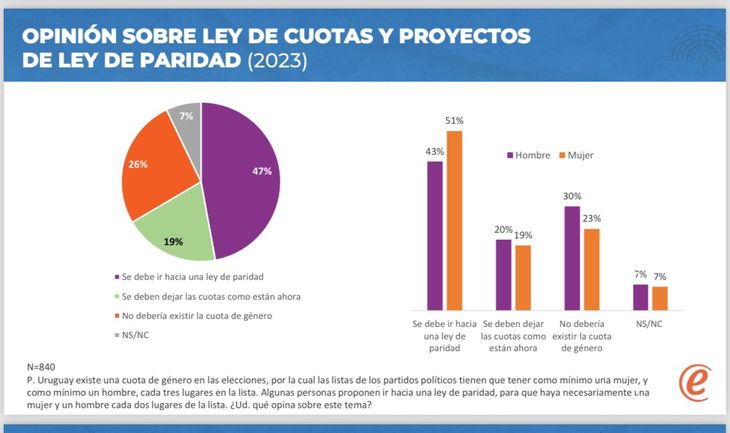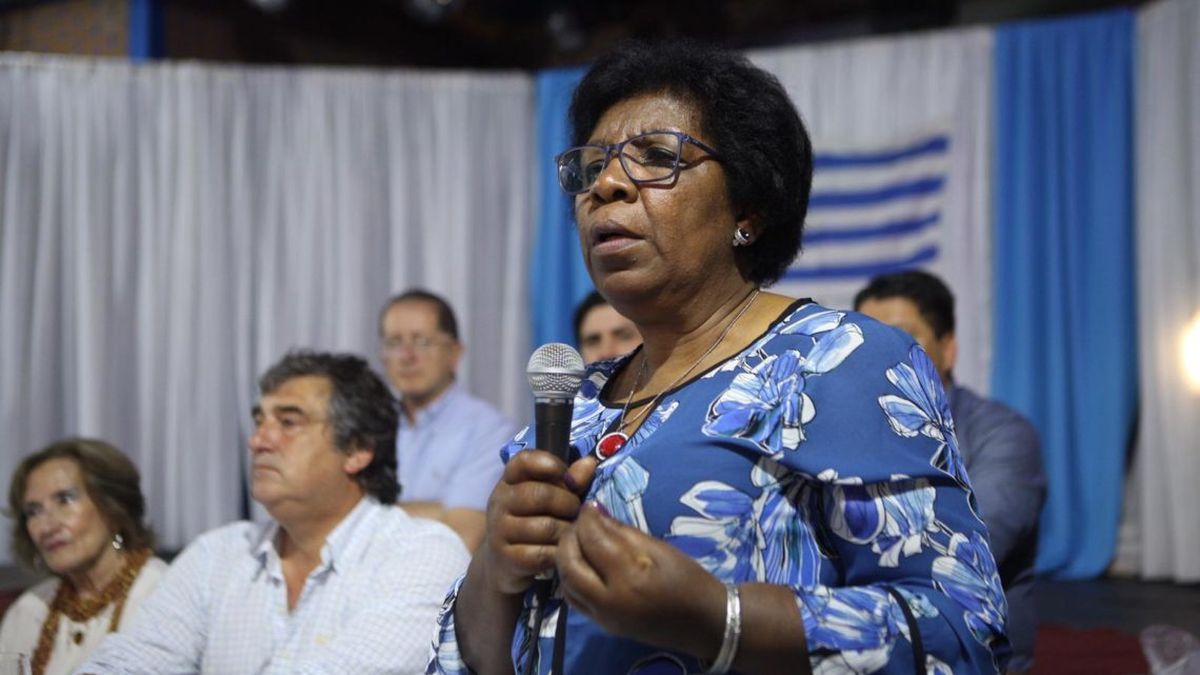Uruguay is headed to vote for the first time in its history gender parity law for the political systemafter the initiative did not prosper in previous periods of government, and in the midst of a resistance that was not completely defeated within the Parliament. For Gloria Rodriguez, senator of National Party and promoter of the project, “it is an important fact for everyone, for women, men, all citizens and for the country, which has always stood out in rights and now in helping opportunities”.
He Parliament Uruguayan has the opportunity to continue making gender history next April 5 at 12, when the Senate Human Rights, Equity and Gender Commission vote for the project parity in politics; deepening a path of equal rights in which he pioneered 92 years ago, with the sanction of the female vote —the first country to do so in the region—, but which, with the passage of time, was neglected to the point of having one of the most unequal parliamentary compositions, with barely 23% of the seats occupied by women.
The project has been in committee since March 8, 2021, when Senator Gloria Rodríguez presented the initiative only with her signature, understanding that, on the one hand, the “misnamed quota law” -the law of equal participation of both sexes (Law 19,555)—of 2019 had not given the expected results; and that, on the other, “the parity It is a right for everyone that has no color or political flag,” which is why he did not want to commit any party to it. Throughout that time, the legislators received multiple civil society organizations and specialists, representatives of the State and women who supported parity.
Gloria Rodríguez Parliament.jpeg
For Senator Gloria Rodríguez, Uruguay has equal rights but not opportunities.
“We consider that now, after three years of treatment in the commission, reality shows us that society is prepared, that our culture needs and demands a project of these dimensions to be able to continue advancing in democracy,” Rodríguez explained in dialogue with Ambit. “The quota law has already given what it had to give and all electoral engineering has been used in order to comply with its spirit. But there is a need for a parity law”, she added, convinced that it is time for Uruguay move towards a parity democracy.
What is the difference between the current quota law and the parity bill?
– First of all, that the project parity covers the Executive, except for the ministers, who are appointed by the president of the moment, and the mayors. The current law in force does not cover the Executive. Another issue that is added and that we consider important is that of the vacancies: Permanent vacancies or vacancies due to death will be covered by the underrepresented sex.
It is a bill that tries to correct some weaknesses in current law. The electoral campaign that we are going through further demonstrates what this project tries to correct: of the confirmed pre-candidacies, only four or five are headed by women. It is clear that we need that push.
How important is the departure today for Uruguayan democracy?
– The parity in Uruguay We are going to have it, it can be delayed for another year, two more years, but it is already installed, there is a need for more women in the Parliament, in it Executive and in places of decision. Many colleagues have told us that our Constitution It says that we are all equal before the law, and it is very true, but we have to help the Constitution, because today In fact we are not all the same. There are disadvantageous situations that do not allow us to be equal, so we need that little push to balance the scales.
One has to play for what one believes without thinking about political costs, I think about those who come, I don’t want the young girls who come and want to do politics to have to go through what I went through. Because we have to do three times as much to achieve the same, and we are the exception: we managed to get there with great difficulty, but we are the exception to the rule. We want it to be something normal, that no one is surprised to have so many women pre-candidates, senators, deputies, ministers. And not because we are women, it is not about filling a box, I want to be there because I prepared myself, because I deserve it, I want to compete, I want the opportunity to compete.
The resistance is not in the streets, it is in politics
Uruguay It is currently ranked 96th in the global ranking of the Inter-Parliamentary Union (IPU) Index, which measures the political representation of women. And it has one of the parliaments with the lowest female participation, with only 23% of the seats occupied by women.
However, a recent study of UN Women and Consulting Team revealed that this difficulty or resistance to the advance of parity It is not found in society, where 64% consider that there should be more women legislators and 47% are in favor of parity; but in the political system itself, something that Rodríguez also pointed out.
UN Women Team Survey.jpeg

The study carried out by Consulting Teams and UN Women revealed that resistance to parity is not in Uruguayan society.
What is the reason for this resistance that you encounter in the political system?
– All changes offer resistance, especially the cultural changes, but parity has already been established in our country. Today everyone, even those who say they are not going to support this bill, in their speeches and in interviews are talking about parity formulas, and some even from joint cabinets. They are aware of the need for parity because the citizens are demanding it, but there is that dichotomy that those who are resisting are not going to vote for it. When the time comes they will have to account for why parity is not accompanied.
In this context, do they have the votes to approve the project? What is the position of nationalist legislators?
– In the commission we already have the votes, Now we are each working with their respective benches. The bench of Wide Front He has already publicly stated that he will fully support the parity law, in the National Party there are colleagues who have already publicly stated that they are not going to support it, although we firmly hope that they will.
The senator (Jorge) Gandini He has stated that he has not voted for any affirmative action regarding women, that he has women on the lists and that he does not support. Now the senator (Graciela) Bianchi has publicly said that she does not vote, and the senator (Carmen) Asiaín He has not clearly stated his position. Afterwards we had talks, our candidate Laura Raffo has spoken with the bench of Add, that there we have the senators Luis Alberto Heber and Carlos Camy. Yes I know that the vice president of the Republic Beatriz Argimon He is going to accompany him, and we have to see the senator’s position (John) Sartori; The senator’s mother said that if she is in the room, she will accompany him. We consider that he is going to come out, that he has to come out.
What other arguments do you hear from those who oppose the parity bill?
– Another argument that has also been used is to say that the electorate is being forced to vote for women. It is not true, it is not a valid argument because, furthermore, the law is not for women and it will be applied in the same way if the underrepresented sex be that of men. Freedoms are not taken away either, because voting is mandatory and the lists that are chosen are already made with the names chosen by others.
Then they also say that where are we going to get it from? prepared women. There are thousands of trained women in our country, women leaders who have no opportunities to lead. We are going to try to ensure that, demographically, more than 52% of the population can be represented in decision-making places, that is what we are working for.
In Uruguay, is there inequality of rights or inequality of opportunities?
– In Uruguay have lack of opportunities. We all have laws that protect us, Uruguay It is a country that is ahead of other countries within the legislative part in advanced, what we lack are opportunities. We have to legislate to have those opportunities, that’s why we work, for everyone.
Source: Ambito




